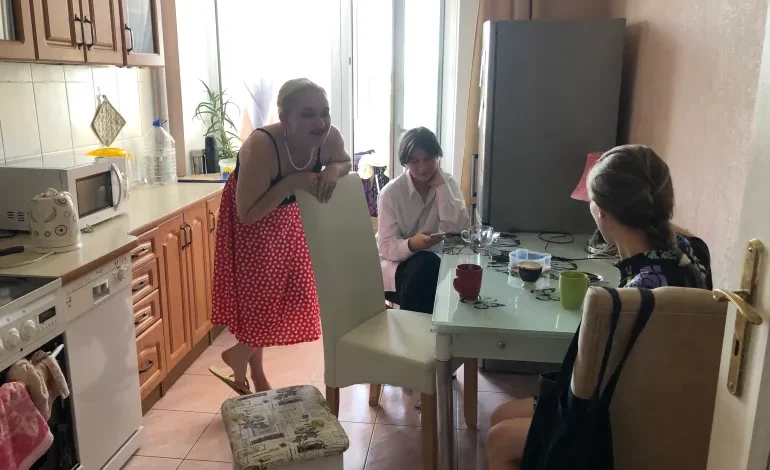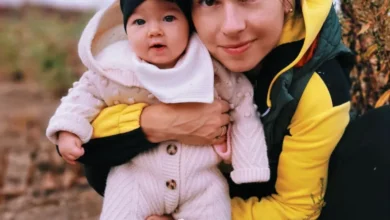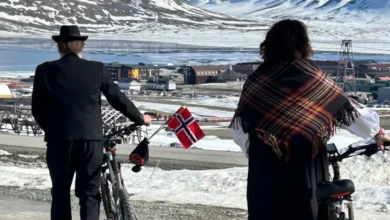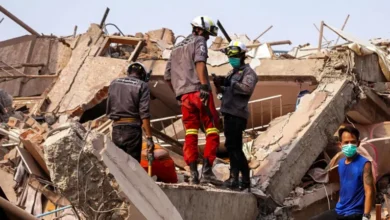The feminist community emerging from the war in Ukraine

Boisterous female laughter emanated intermittently from the corner unit of a drab, Soviet-style residential building. Sandals and a pink lamp sat at the entrance to the warmly-lit apartment, reached via the gloomy communal corridor.
Inside, the smell of baked fish wafted from the kitchen.
Twenty-three-year-old Mira Kapitan, a cheery copywriter and hip-hop artist originally from a suburb of Kyiv, had just popped mackerel in the oven. Also in the kitchen was her flatmate Tanya Vynska, an 18-year-old political science student with dyed orange hair.
Over the past few months, Mira, who arrived in the western Ukrainian city of Lviv with just a small suitcase, has enjoyed sharing clothes and style tips with Tanya. “We both love dresses,” she grinned, divulging how Tanya loaned her a dress for a date the other day.
The suburban Lviv apartment where Mira and Tanya live – known affectionately as “FemApartment” by its residents – was originally meant to be a temporary home to five young women. Now, however, it is a refuge for the women – strangers to one another until June last year – for as long as they need.
The women were forced to flee from different parts of Ukraine – mostly in the country’s northeast – when the full-scale invasion by Russia began in February 2022. Unable to afford to rent a room in Lviv, they found themselves homeless, but through TikTok and other social media, they learned about a shelter for women involved in different types of community activism.
A home for activists
Katya Dovbnia is a coordinator at Feminist Workshop, a grassroots-led NGO that conducts seminars and other activities on social issues relating to women, including gender-based violence. When the war broke out, she secured temporary housing in Lviv from private owners for about 23 women and children who lost their homes in February, and accommodation for internally displaced women activists. Aside from taking care of the rent at both places, Feminist Workshop provides basic essentials like household and hygiene products and a weekly food basket. Both homes are supported through online fundraising and grants from other NGOs in Europe.
To qualify to live at FemApartment, the women had to have some experience in activism and be willing to volunteer to support others also affected by the war. These requirements, Katya says, are in line with the organisation’s ethos that feminism tackles a wide range of social injustices.
On an afternoon in late July, Tanya, wearing a pale pink T-shirt and trousers, stood by the wall while Mira checked on the fish. Katya and Veronika Yuzepchuk, an 18-year-old film student, joined them.
Expressive and outgoing, Tanya says that she and her flatmates practise “non-toxic living” by ensuring that everyone’s personal space is respected. “We all agreed that we’ll always ask permission to do things if we’re in the same room. For example, just because someone is here in the kitchen with me, doesn’t mean they feel like talking to me at the moment. I ask if they’re in the mood,” she explained.
These habits, Tanya stressed, are important in the context of shared living. She added that they “love” their duty roster, which stipulates their cleaning duties for the communal areas. Cohabiting has been surprisingly easy, the three women agreed, despite their initial apprehension about sharing a flat with unfamiliar housemates.
“We’ve never had any arguments, no serious conflicts,” Mira said with a laugh. “We treat one another well.”
The flatmates
Despite some of the women having to share a room, the apartment feels spacious. Tanya showed me the room where she shares a double bed with Veronika who is from Kharkiv, a city in the northeast region of Ukraine that has been one of the most heavily attacked throughout the war.
Shy and dressed in an oversized shirt, with her dark hair pulled into a ponytail, Veronika said that the night in June before she left for Lviv, a missile struck her neighbourhood, destroying a school just 30 metres (about 100 feet) from her house.
Behind their bed is a photographic mural of the New York cityscape and fairy lights hang over their shared dresser. “We try to live as normally as we can, but it does feel like we’re having a sleepover every night,” smiled Veronika, referring to the relative lack of personal space.
Two doors down is Mira’s room. She has a bed while her roommate, Yana, who was out, typically sleeps on a mattress on the floor. “I play the ukulele here sometimes if Yana doesn’t mind,” Mira said, “and we just hang out together here, at the end of the day.”
Ivanka Kutsenko, 29, a volunteer for the non-profit Lviv Vegan Kitchen, who was out delivering free plant-based food by bike to people who cannot afford meals, is the only woman in FemApartment with her own room.
Feminist initiatives
Tanya had been living with other students from her Lviv university when the war started but realised she had nowhere to go when the dormitory shut for the summer in June, with a lot of uncertainty about whether it would reopen. Her parents’ home in the wider Lviv region was “too far for me to go and live” with them, she said. So she found a place in the city to stay for when university restarted.
Her proficiency in English meant that she was able to find plenty of volunteering opportunities with international NGOs that have flocked to Lviv since the beginning of the war, including translating for a team of American medics who were caring for injured people, and distributing humanitarian aid along the Polish border.
But she has also found volunteering opportunities through a feminist initiative started by Yana, which Ivanka is also part of.
The initiative, Bilkis, works on educational projects to raise awareness of issues surrounding women’s rights such as domestic and sexual violence and also organises humanitarian assistance for women and LGBTQ people. Through social media, including on its Instagram account, Bilkis has also documented numerous accounts of women who have been sexually harassed or assaulted in Ukraine. In recent months, Bilkis has also participated in forums to discuss the role of women in rebuilding Ukraine after the war.
Along with another member of Bilkis, Ivanka has also created a zine focused on women and LGBTQ people engaged in community activism, which is meant to serve as a tool for people hoping to get their own humanitarian projects off the ground. Meanwhile, Tanya has helped to produce educational materials for Bilkis’ projects. “If not for this apartment, I would never have heard of Bilkis, and become so close to them,” she said of her flatmates.









